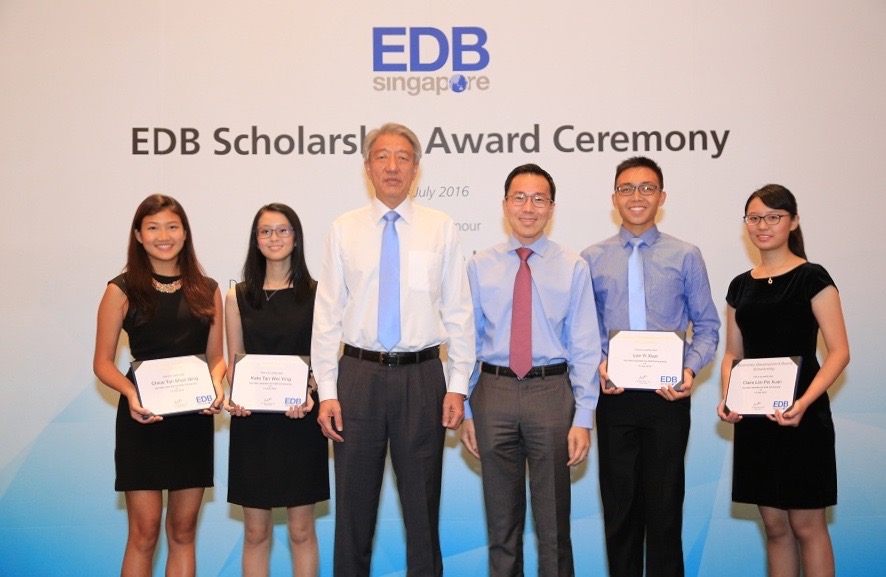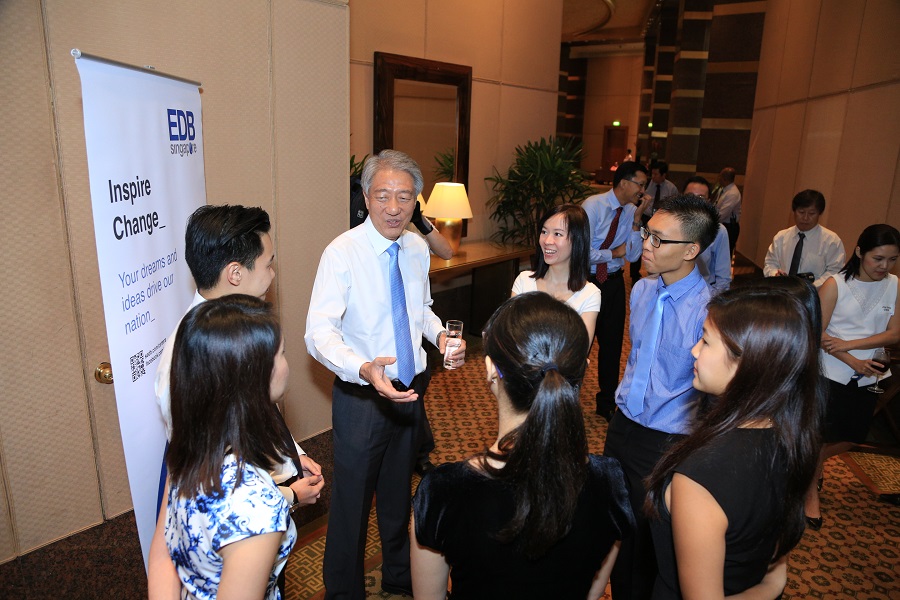DPM Teo Chee Hean at EDB Scholarship Award Ceremony
Speech by DPM and Coordinating Minister for National Security, Teo Chee Hean, at EDB Scholarship Award Ceremony on 13 July 2016.
Distinguished Guests
EDB Scholars
Ladies and Gentlemen
Introduction
Good afternoon. Congratulations to our five EDB scholarship recipients today. I would also like to congratulate your parents, teachers and principals who have helped you to grow and develop over the years.
The Economic Development Board which celebrates its 55th anniversary this year, has helped Singapore’s economy grow and develop over the decades. Today, Singapore is a thriving city-state with one of the most vibrant economies in the world. We have been recognised by the World Bank as the world’s most business-friendly economy since 2006. We are plugged into the global network of cities, and well-connected to the world by air, sea and communication links.
Seizing new and exciting opportunities for Singapore, amidst new challenges
But, our operating context is changing rapidly.
New technologies such as 3D printing, robotics and digitisation are disrupting traditional industries that have helped us prosper. But they are also creating new possibilities that we could only dream of before.
We have to re-evaluate the basis of our competitiveness, and build on our core strengths to seize these new opportunities. Our geographical position places us in one of the fastest growing regions in the world, with a burgeoning middle class population. The ASEAN Economic Community offers a regional market of over 600 million people, and China and India add another 2.6 billion.
We have a well-educated population, which has a reputation for integrity and diligence, and increasingly for creativity and innovation.
We provide a stable base – politics, policy, legal and financial rules – from which companies can launch into the region and beyond.
We are open to the world – to investments, people and ideas – to come together here to create new value.
These are precious assets which are not easy to replicate. We should capitalise on them to strengthen our position as a good place to do business, and an attractive investment destination, to provide opportunities and good jobs for Singaporeans.
Creating Value for Companies, for Singapore, for Singaporeans
This is why we are working hard to transform Singapore from a “value-adding” to a “value-creating” economy. How do we do this? We will build on our strong foundation of quality and trust, play a bridging role connecting markets and industries, and invest in research and innovation.
First, quality and trust. The quality and trust that we have built up over the years puts us in good stead for this next phase of our economic journey. Companies trust in Singapore’s skilled manpower, soft and hard infrastructure. Rolls-Royce is a good example. In addition to its manufacturing, assembly and test facility, Rolls-Royce chose to locate its Advanced Technology Centre in Singapore. The Centre develops new processes for surface modification and finishing. New electrical systems that can reliably work with aircraft engines and help power electronics and control systems. New repair techniques, especially for composite parts. For such systems and processes, a lot is at stake, so quality and trust are key. We are delighted that this strong partnership between Singapore and Rolls-Royce has borne its first results. Last year, Rolls-Royce Singapore filed its first global patent, which covers technology for electrical systems that will power future Rolls-Royce engines.
Second, connectivity. Singapore has traditionally served as a bridge between the East and the West, by virtue of our physical location. To create value, we can also play a role by bridging companies in different sectors and industries. This will become even more important given that new technologies are disrupting and merging traditional industry lines. For example, marrying healthcare and technology. Just last month, IBM launched its Watson Centre at Marina Bay, to facilitate partnerships between big and small players to co-create solutions. The centre is powered by its artificial intelligence engine Watson – a cognitive technology tool that can analyse vast amounts of data, make sense of it, and, critically, learn from new data. It has tied up with Parkway Pantai healthcare group to use Watson technology in intensive care units at Mount Elizabeth Novena Hospital. This is a first in our region and an example of how Singapore creates value by bringing together companies from different sectors.
Third, knowledge. Singapore has invested steadily in R&D for several decades to create new knowledge and drive innovation. From our first $2 billion Science and Technology five-year Plan launched in 1991, we announced our sixth 5-year plan earlier this year, committing $19 billion to research, innovation and enterprise from 2016 to 2020. This is close to 1 per cent of our GDP, comparable to the US and also similar to public R&D spending by other small research-intensive economies.
FinTech is an area where the Singapore Government is supporting more research and innovation, building on our strengths as a key financial centre in Asia. In December last year, Standard Chartered Bank, DBS Bank and IDA successfully completed a proof of concept delivering the world’s first application of distributed ledger technology or blockchain to enhance risk mitigation in trade financing. Digitising and authenticating records reduces the risk from duplicate invoice financing fraud and improves efficiency, compared to the current paper-based documentation. The next step is to involve other stakeholders including government agencies and other banks to contribute to the commercial adoption of this initiative. If successful, it will also enhance Singapore’s position as a leading global centre for international trade and trade finance.
Exciting times for Singapore – investing in human capital development to support future growth
To ensure that Singapore continues to be a good partner for companies seeking to create new value, we will continue to invest heavily in the education and training of Singaporeans. In our 50 year journey since Independence, we have moved from mass primary education through mass secondary education, and have already achieved mass tertiary education. We are now placing strong emphasis on achieving mass continuing education through lifelong learning via initiatives such as SkillsFuture. By helping Singaporeans to learn throughout life, we want to give every Singaporean the opportunity to be on the right side of the big global divide. So that Singaporeans can be among those with skills in demand who can earn good wages, rather than those with no particular skills who have their wages depressed by the large number of workers in the global workforce.
Take a data scientist, for example. Such a role and career path did not exist until recent years with the widespread adoption of big data and analytics. In May 2016, Twitter announced its plans to set up its first data science team outside the US in Singapore, and plans to hire up to 10 data scientists to develop new products for major markets such as Japan, India, Indonesia, the Philippines and Brazil. Google and Facebook also have their tech teams in Singapore, and we expect to see further growth in such jobs here in the next few years. Such developments will provide Singaporeans with exciting job opportunities not just focused on the local market, but also on the regional and global stage.
EDB – Developing Leaders to Enable the Future
Just as we help Singaporeans to continue learning throughout life, EDB officers need to continually look out for disruptive global and regional changes, and help Singapore stay ahead of the competition. EDB officers must have the drive, dynamism and imagination to envision the future of Singapore; and the practicality, perseverance and resilience to make it a reality.
To our five EDB scholars today, we hope that you will seize the many development opportunities available to you, and actively seek out your own learning paths. Keep an open mind and learn from the experiences and environment around you. Always remember that what you do must serve the interests of fellow Singaporeans, and Singapore.
We wish you all the best as you embark on your new journey, and look forward to your meaningful contributions in shaping the future of Singapore’s economy. We count on you to continue EDB’s good work for many more years to come. Congratulations once again.
Explore recent content
Explore related topics


